Montreal Canadiens
What A Cole Caufield Extension Could Look Like For Montreal Canadiens

The Montreal Canadiens are undergoing a roster transformation, and winger Cole Caufield is right in the center of it. Now eligible to negotiate an extension as of July 13, should the Canadiens pounce, as they did with Nick Suzuki last year, to sign Caufield to a long-term extension before his entry-level contract (ELC) has been completed?
TVA Sports’ Tony Marinaro was on the Sick Podcast when he claimed that he wouldn’t be surprised in the slightest if the Montreal Canadiens signed Caufield to a long-term extension this summer, as the young winger seems to have immersed himself pretty quickly in the fabric of the team and the culture of the city.
Cole Caufield is an electrifying player that had quite the rollercoaster of a calendar year. Breaking out in the NHL during the 2021 NHL Playoffs alongside sophomore Nick Suzuki, starting the following season on the top-line, ending up in the minors within a month of the 2021-2022 season, scoring just one goal in 30 games under Dominque Ducharme and then exploding for 35 points in 37 games under Martin St. Louis. That’s a heck of a year, but finishing it off as strong as he did, scoring 22 goals in just 35 games, gives the Canadiens an idea of what levels Caufield could reach as he continues to develop in the NHL.
Caufield is about to enter the last year of his entry-level contract during the 2022-2023 season and is eligible to negotiate an extension as of July 13, and the Montreal Canadiens could look to lock up their young sniper long-term a little earlier to ensure his Cap hit is lower for years to come. This is a risk, of course, should he have a down year or not continue to live up to the goal-scoring pace he had during the 2nd half of the season, but it’s a risk that has become common in the NHL. Nick Suzuki, for example, signed his 8-year contract in August of 2021, 11 months before his ELC was set to expire, and it will likely be a very valuable deal for the club for many years to come if he continues to improve.
But what would a Caufield extension look like on a long-term basis? Let’s look at some comparables:
Nikolaj Ehlers
Nikolaj Ehlers signed a seven-year deal with a Cap hit of $6M just as he was starting the final year of his ELC. Ehlers had followed up a 38-point rookie season with the Winnipeg Jets with a 64-point sophomore campaign that included 25 goals. Jets general manager Kevin Cheveldayoff saw fit to jump to signing Ehlers, as his progressional curve showed that it was a pretty sure bet that Ehlers would continue to produce at this rate, and even potentially improve. Ehlers’ Cap Hit of $6M at the time took up 8% of the available Salary Cap, a stat we’ll get back to in short order.
Clayton Keller
Clayton Keller is another skilled right-winger that was signed prior to the conclusion of his ELC. The Arizona Coyotes saw fit to offer their former 7th overall pick an eight-year deal with a Cap hit of $7.15M AAV after putting 65-point and 47-point seasons in his first two years in the desert. Despite the dip in Keller’s production in the 2nd year of his ELC, Keller was still able to get quite the contract for himself from the Coyotes. Despite an equally disappointing 3rd year in the NHL, his 4th and 5th seasons, the latter of which being a 63-point campaign in just 67 games, helped get him back on track and show that he is now more than worth the risk the Coyotes took on him in 2019. At the time of this signing, Keller’s contract occupied 8.77% of Arizona’s available Cap space.
Jake Guentzel
Right before the middle of the 2018 season, in the final year of his ELC, Jake Guentzel signed a five-year deal with a Cap hit of $6M per season. Guentzel had put up solid numbers during the regular season in his first two years in the NHL, but was an absolute revelation in the playoffs for the Pittsburgh Penguins, potting 42 points in 36 playoff games as a rookie and sophomore. Showing signs of elite play, then general manager Jim Rutherford jumped to sign his emerging winger before the summer, and the risk was well worth it for the Penguins, as Guentzel has put up a 1.07 points-per-game pace in the three seasons following the signing of his extension. At the time of the signing, Guentzel took up 7.55% of the Penguins’ Cap space.
Verdict
If the Montreal Canadiens do decide to give Caufield a long-term deal in the seven or eight-year range, one should expect the deal to hover around 7.5% to 8% of the Montreal Canadiens’ Cap structure, based on the rate that players in the past have signed. Although the reality of the Salary Cap is different from year to year, NHL agents like to use the Salary Cap percentage as a benchmark for negotiating contracts, as it ensures their clients retain relative value on their deals as the Salary Cap fluctuates.
Based on that, a seven-year deal with a $6.5-7M Cap hit would be within the realm of possibility for a player like Caufield at this junction, should the Montreal Canadiens be sold on the player and seek to lock another member of their young core up for years to come. There may be some risk involved, but, more often than not, it’s well worth the risk when it comes to high-talent players on young and burgeoning teams.









